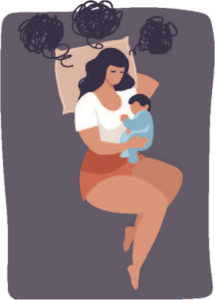Expecting with ADHD: Surviving Pregnancy, Birth, and Life as a New Mother
Liz Lewis
Download PDF
I always knew I wanted to be a mom. Growing up with a single mother, I had a clear-eyed understanding of the challenges of parenting. But nothing—no book, no advice—prepared me for the ways ADHD would shape my experience of pregnancy, birth, and the early months of parenthood.
 When I became pregnant, I quickly realized that the conversations around ADHD and motherhood were lacking. There was little guidance on how to navigate the unique challenges of ADHD during pregnancy, and even less discussion on what happens when a neurodivergent brain collides with the hormonal and emotional rollercoaster of new parenthood. So, I started writing about it. Ten years later, I’ve had the opportunity to talk with so many mothers—many of whom feel deeply pulled toward motherhood but worry about their capacity to be the kind of mom they want to be.
When I became pregnant, I quickly realized that the conversations around ADHD and motherhood were lacking. There was little guidance on how to navigate the unique challenges of ADHD during pregnancy, and even less discussion on what happens when a neurodivergent brain collides with the hormonal and emotional rollercoaster of new parenthood. So, I started writing about it. Ten years later, I’ve had the opportunity to talk with so many mothers—many of whom feel deeply pulled toward motherhood but worry about their capacity to be the kind of mom they want to be.
And they’re not alone. The idealized, almost mythical concept of the “perfect” mother looms large in our culture. Many mothers diagnosed with ADHD already feel they aren’t living up to their full potential, and the unrealistic expectations surrounding pregnancy, birth, and new parenthood make that even more daunting.
Pregnancy: information overload and sensory overwhelm
Pregnancy is supposed to be about glowing skin and baby kicks. Instead, for me, it was a sensory overload, an avalanche of paperwork, and an executive function nightmare. ADHD brains struggle with filtering information, and pregnancy comes with an endless stream of it: appointments, testing, hospital forms, insurance paperwork, and a list of “dos and don’ts” that never seem to end.
Alixandra Bacon is the coauthor of the Pregnancy and ADHD Workbook and a registered midwife specializing in working neurodivergent births. She explains, “ADHD people may struggle with the endless paperwork from hospital pre-registration to physician intake to insurance.” The sheer volume of information can be paralyzing. At the same time, too much or too little information can cause anxiety. Some ADHD parents need every detail to feel prepared; others shut down under the weight of information overload.
And then there’s the sensory aspect. Pregnancy is a full-body experience, and ADHD brains often struggle to prioritize sensory input. Bacon notes, “ADHD folks are highly sensitive, and our brains don’t know which sensory input to prioritize. For some, the discomforts of pregnancy are magnified. For others, poor interoception makes things like fetal movement counting a major source of stress.”
Victoria White, a birth and postnatal doula, is also the founder and director of ND Birth, a website, podcast, and community that supports neurodivergent pregnancy, birth and beyond. Both White and Bacon suggest requesting multimodal types of support and being specific in your requests. For example, if you need written and verbal instructions, communicate that to providers. Consider bringing someone along to assist in notetaking, scheduling for testing, and planning for pain relief during labor.
If I’d requested more specific support and better communication, I probably would have been more, “compliant,” and not eaten two pop-tarts before my own gestational diabetes test. Did you know that healthcare providers use words like “noncompliant” when you don’t follow directions? Ask me how I know.
Having a plan for communication with healthcare providers is key: requesting both written and verbal instructions, bringing a support person to appointments for notetaking, and advocating for multimodal support when making medical decisions.
ADHD brains struggle with filtering information, and pregnancy comes with an endless stream of it: appointments, testing, hospital forms, insurance paperwork, and a list of “dos and don’ts” that never seem to end.
Birth and the “care cliff”
Pregnancy is a transition into parenthood. But birth? Birth is a free fall. One moment, you’re pregnant. The next, you’re a mother holding a baby and expected to function.
Planning for birth with ADHD means taking extra steps to reduce last-minute stress and executive function overload. Traditional birthing plans can feel overwhelming, so consider a one-page birth preferences sheet with bullet points to highlight what matters most. Using visual layouts or color coding can help medical staff quickly scan your priorities.
It’s also helpful to do a practice run—visit the hospital, time the drive, and know where to park and enter. Create a step-by-step checklist for the big day, like “call provider, grab go-bag, confirm transport,” so you don’t have to rely on memory in a high-stress moment. If verbal processing is difficult under pressure, let your support person know how you prefer medical staff to communicate with you.
Packing an ADHD-friendly go-bag well in advance can make a huge difference. Use labeled pouches for different categories—documents, snacks, comfort items, and post-birth essentials—so you can find what you need without digging through a mess. Consider including sensory regulation tools like noise-canceling headphones, an eye mask, or a weighted blanket to help manage hospital overstimulation. Remembering to eat under stress can be challenging, so packing protein-rich snacks and electrolyte drinks can be helpful.
 Despite all the preparation, the shift from pregnancy to parenthood can feel abrupt and overwhelming. The predictable structure of prenatal visits and planned milestones disappears, replaced by the chaotic, unpredictable demands of caring for a newborn. For ADHD parents, this can create an intense sense of disorientation.
Despite all the preparation, the shift from pregnancy to parenthood can feel abrupt and overwhelming. The predictable structure of prenatal visits and planned milestones disappears, replaced by the chaotic, unpredictable demands of caring for a newborn. For ADHD parents, this can create an intense sense of disorientation.
Science educator, author, and new mom Jessica McCabe of How to ADHD calls this “falling off a care cliff postpartum.” During pregnancy, you have regular check-ins, provider visits, and a structured timeline. After birth? You’re suddenly expected to know what to do. And for mothers living with ADHD, the lack of structure, sleep deprivation, and executive function overload can feel like drowning—or falling off a cliff.
In addition to adjusting to life with a newborn, ADHD moms are at a much higher risk for postpartum mood disorders. Research suggests that up to 58% of ADHD mothers experience postpartum depression—a number that doesn’t even account for the significant percentage who develop severe postpartum anxiety. For those who discontinue stimulant medication during pregnancy, executive function crashes can hit hard, compounding emotional struggles.
ADHD doesn’t disappear when you become a mother. If anything, it gets magnified.
Navigating stimulant use during pregnancy
Stimulant use during pregnancy is a hot topic, with many neurodivergent individuals facing difficult decisions about whether to continue, reduce, or stop their medications. While research is ongoing, mounting evidence suggests that neurodivergent people experience higher rates of perinatal mental health challenges compared to the general population—particularly when left without adequate support.
I’ve spoken to women who chose to discontinue their stimulant medications during pregnancy and others who continued taking them, either at a lower dose or their regular dose. For those who continue, current research suggests that risks appear to be relatively low, but every situation is unique.
Bacon explains, “Ideally, your provider offers information on the Benefits, Risks, and Alternatives to medication, as well as guidance on the Interval you have to make the decision, and reminders that you always have the right to say No” (BRAIN framework).
ADHD-Friendly Strategies for New Moms
Navigating the complexities of ADHD and new motherhood is a journey, not a destination. The tools, routines, and supports that worked for you before will likely need to be adjusted as you step into this new role. Here are some practical strategies to help ease the transition.
Plan ahead.
While still pregnant, think about the postpartum period. Delegate tasks before giving birth—set up a meal train, stock essential supplies, and establish boundaries with visitors to minimize stress.
Don’t go it alone.
Talk openly with your partner about the help you’ll need. If you’re a solo mom, schedule regular visits from friends or family to ensure you have support. Practice asking for and accepting help—it’s a skill worth building.
Support your postnatal sensory needs.
New motherhood can be a sensory overload. Noise-canceling headphones, calming scents, and fidget tools can help manage overstimulation. Having entertainment on hand—movies, books, podcasts, or even a favorite snack—can provide a needed mental break.
Manage your expectations.
The first few weeks will be messy, and that’s okay. Your ADHD symptoms and emotional regulation may fluctuate more than usual. Prioritize the basics—food, hydration, and sleep—and let go of unrealistic expectations.
Communicate with your care team.
Set up reminders for your postpartum checkups and mental health screenings. Be honest about your emotional state—there are no “silly” questions when it comes to your well-being. Midwives, doulas, and lactation consultants often have more time than doctors to provide guidance and reassurance.
Find mom mentors and friends.
Seek out connections with other moms, whether or not they have ADHD. But remember, your ADHD presents unique challenges that may complicate your journey. You can find other parents living with ADHD through your local CHADD chapter. Building a support network can make a world of difference.
Making the decision: what to consider
Deciding whether to adjust or stop stimulant medication during pregnancy is a highly individual choice.
Factors to consider include:
- Mental health and functioning. Will stopping medication significantly impact your ability to manage daily life, work, or self-care?
- Risk vs. benefit analysis. How do the potential risks of medication compare to the risks of unmanaged symptoms?
- Previous pregnancy or medication experiences. If this isn’t your first pregnancy, how did you fare with or without medication last time?
- Medical history and individual risk factors. Discuss any pre-existing conditions or high-risk pregnancy factors with your provider.
Working with your care team
Because this decision is so personal, it’s important to consult a supportive, informed care team that understands both neurodivergence and pregnancy.
This may include:
- Your doctor or psychiatrist—to discuss medical risks and benefits.
- An ADHD-informed therapist or coach—to explore alternative symptom management strategies if discontinuing medication.
- A midwife or OB-GYN—to assess how stimulant use may interact with pregnancy-specific concerns.
THERE ARE NO UNIVERSALLY “RIGHT” CHOICES—only the ones that best support your well-being. Access to the right information, a knowledgeable provider, and a nonjudgmental support system can make all the difference.
Overwhelm, isolation, and unrealistic advice
Pregnancy is a liminal space, a transition. After birth there’s no transition, you’re expected to function as a parent immediately. We are only now beginning to explore the profound changes that happen in the brain of new moms during and after pregnancy. As you can imagine this transition doesn’t always go smoothly for those with brain-based challenges.
While there’s a lot of content on parenting, there isn’t much about how becoming a parent affects the neurodivergent birthing person. The reality is that you are rewiring your brain, rewriting your life story, and losing grey matter, all at once. It’s exhausting. These changes are not limited to women giving birth, as research indicates adoptive mothers undergo the same neurological rewiring when caring for a new infant.
In addition to retrofitting a few billion neurons, women with ADHD are far more likely to suffer with postpartum mood disorders. It is estimated that up to 58% of ADHD women experience postpartum depression. This doesn’t even account for those who have extreme anxiety like I did, or OCD. I had the advantage of knowing about my ADHD, but not everyone is so fortunate. Many ADHD individuals aren’t aware of the role hormones play in ADHD symptoms and suffer through it alone and unsupported.
There’s a cultural expectation that motherhood is a rite of passage, something we all endure with little complaint. But that silence is exactly what makes new mothers living with ADHD feel so alone.
Resources for ADHD Moms
Navigating pregnancy, birth, and early motherhood with ADHD can be challenging, but you’re not alone. Here are some valuable resources for peer support, education, and personal growth.
Coaching & Support
- Dusty Chipura | one-to-one and group coaching |https://www.vancouveradhdcoaching.com/
- CHADD | National ADHD organization offering parent and adult peer support groups | https://chadd.org/
- Jessica McCabe (How to ADHD) | Educational videos, resources, and community support for ADHD adults and parents | https://www.youtube.com/c/HowtoADHD
Educational Resources
- Pregnancy and ADHD Workbook | A practical guide by Dusty Chipura & Alixandra Bacon | https://www.adhdpregnancy.ca/
- Prep for Neurodivergent Birth | Recorded one-hour webinar session by Victoria White, a doula and neurodivergent mom | https://www.ndbirth.com/for-parents
Podcasts & Books
- The Neurodivergent Birth podcast | Insights from Victoria White on pregnancy, birth, and parenting as a neurodivergent mom and doula | https://www.ndbirth.com/podcast
- Mother Brain: How Neuroscience Is Rewriting the Story of Parenthood by Chelsea Conaboy
- The Good Mother Myth: Unlearning Our Bad Ideas About How to Be a Good Mom by Nancy Reddy | Challenges unrealistic societal expectations of mothers
Visitors come and go. You’re told to “just sleep when the baby sleeps” (which is both impossible and insulting). You get advice that sounds like it came from Ladies’ Home Journal circa 1987. And through it all, you’re expected to keep functioning, despite massive hormonal shifts, severe sleep deprivation, and an executive function system that is stretched to its limit.
The reality? Being a mom with ADHD looks different for everyone, but for new moms with ADHD, overwhelm and isolation are extremely common. In times like that, one of the best ways to find immediate relief is through peer support.
It’s why there are Mommy and Me groups—to provide a sense of community and shared experience. Organizations like CHADD offer ADHD-specific peer support groups that can help you connect with other moms juggling ADHD and parenthood. Connecting with other parents who understand the unique challenges of ADHD can provide not only emotional validation but also practical strategies that truly work. Finding a community, whether online or in person, can help reduce feelings of isolation and build confidence in your parenting journey.
Executive function and parenting: making it work
Mothering with ADHD means constantly juggling tasks that require working memory, time management, and organization—skills that many of us struggle with. The mental load of keeping track of appointments, feeding schedules, and baby supplies can quickly become overwhelming, especially on little to no sleep.

Many mothers with ADHD experience time blindness, making structured routines difficult to maintain. Decision paralysis can make even small choices—like choosing a pediatrician or figuring out the best bottle—feel overwhelming and impossible.
Executive dysfunction can also make task initiation and follow-through more challenging. Simple tasks—like sterilizing bottles or remembering to restock diapers—can feel monumental when the brain struggles to shift into action. When exhaustion and overwhelm hit, it’s easy to fall into an all-or-nothing cycle, swinging between hyperfocus and complete shutdown.
To make things easier, externalize information and automate where possible. Set recurring alarms for feedings or naps, keep lists in your phone or on a whiteboard, and create “point-of-performance” stations—like keeping diaper supplies in every room where you might need them. The fewer steps required to complete a task, the better.
Finding ways to reduce decision fatigue is also key. Pre-deciding small but frequent choices—such as setting up automatic deliveries for baby supplies, prepping simple meal rotations, or having a “default” bedtime routine—can ease the constant mental strain.
Delegating tasks where possible and building in backup plans for forgetfulness can also be lifesaving—like keeping a spare diaper bag in the car or setting up recurring calendar reminders for doctor visits.
Dusty Chipura, ADHD coach and coauthor of the Pregnancy and ADHD Workbook, offers, “keep a running list in your phone of anything you think of that you want or need to do, and when people ask ‘How can I help?’ just take a screenshot and send them the list.” If you’re pregnant or a new mom and reading this on your phone, do it now!
It’s also important to recognize and adjust expectations. Moms with ADHD may struggle with consistency, but that doesn’t mean they can’t create systems that work for them. Small tweaks—like choosing a flexible feeding and sleeping routine instead of a rigid schedule—can make all the difference in reducing stress.
Final thoughts: a call for more support and understanding
More resources, education, and awareness about ADHD during pregnancy and early motherhood are essential. What’s missing isn’t the capability of ADHD parents—it’s the support systems to help navigate this time. By advocating for ADHD-informed prenatal and postpartum care, we can ensure that women with ADHD who are entering motherhood or adjusting to new parenthood feel seen, supported, and empowered.
Being a great mom with ADHD isn’t about perfection—it’s about finding what works for you and embracing the path as it unfolds.
 Liz Lewis is a writer, ADHD coach, and community facilitator dedicated to supporting women and mothers with ADHD. Through her website, HealthyADHD, coaching, and speaking engagements, she offers practical, relationship-focused support for ADHD women navigating motherhood, mental health, and daily life. She has facilitated peer support groups for ADDA, spoken at national conferences, and spent over eight years researching and writing about ADHD. She is currently working on her first book exploring ADHD, motherhood, and more (available in December 2025). When she’s not coaching or writing, she enjoys reading, fitness, and spending time with her husband, son, and their very opinionated dog. You can find her at https://healthyadhd.substack.com.
Liz Lewis is a writer, ADHD coach, and community facilitator dedicated to supporting women and mothers with ADHD. Through her website, HealthyADHD, coaching, and speaking engagements, she offers practical, relationship-focused support for ADHD women navigating motherhood, mental health, and daily life. She has facilitated peer support groups for ADDA, spoken at national conferences, and spent over eight years researching and writing about ADHD. She is currently working on her first book exploring ADHD, motherhood, and more (available in December 2025). When she’s not coaching or writing, she enjoys reading, fitness, and spending time with her husband, son, and their very opinionated dog. You can find her at https://healthyadhd.substack.com.
CITATIONS & ADDITIONAL READING
Bacon, A. (2025). Interview on neurodivergent pregnancy and birth. Host of ND Birth Podcast.
White, V. (2025). Interview on neurodivergent pregnancy and parenthood. Host of ND Birth Podcast. ADHD and Pregnancy Workbook.
Chipura, D. (2025). Interview on ADHD coaching and neurodivergent parenthood. Vancouver ADHD Coaching. ADHD and Pregnancy Workbook.
McCabe, J. (2025). Interview on ADHD and early motherhood. How to ADHD.
Andersson, A., et al. (2023). Depression and anxiety disorders during the postpartum period in women diagnosed with ADHD. Journal of Affective Disorders, 325, 817-823.
Scoten, O., et al. (2024). ADHD in pregnancy and postpartum. American Journal of Obstetrics and Gynecology, 231(1), 19-35.
Li, L., et al. (2020). Associations of Prescribed ADHD Medication in Pregnancy with Pregnancy-Related and Offspring Outcomes: A Systematic Review. CNS Drugs, 34, 731–747.
Oatridge, A., et al. (2002). Change in Brain Size during and after Pregnancy: Study in Healthy Women and Women with Preeclampsia. American Journal of Neuroradiology, 23(1), 19-26.
White, V. (2024). ND Birth: Neurodivergent Pregnancy and Parenting Resources. https://www.ndbirth.com/
ND Birth Podcast. (2024). The Neurodivergent Birth Podcast. https://www.ndbirth.com/podcast
White, V. (2024). Prep for ND Birth Recorded Webinar. https://www.ndbirth.com/for-parents
CHADD + ADDA. (2024). ADHD Parenting Support Resources. https://chadd.org/
Conaboy, C. (2022). Mother Brain: How Neuroscience is Rewriting the Story of Parenthood (Henry Holt and Co., 2022).
Reddy, N. (2014). The Good Mother Myth: Unlearning Our Bad Ideas About How to Be a Good Mom (St. Martin’s Press, 2025).
Other Articles in this Edition
A Virtual Village of Learners: Young Scholars Academy
How Satisfied Are You with Your Friendships?
ADHD and Social Functioning, Health, and Life Expectancy
Can AI Revolutionize Education for Students with ADHD?
Disorganization and Adolescents with ADHD
Adjusting to College: A Unique Model of Student Support for ADHD
Expecting with ADHD: Surviving Pregnancy, Birth, and Life as a New Mother
ADHD and Focus Fitness: The Gym Isn’t Just for Your Body Anymore
Chasing Excitement in a Bottle: How I Mistook Alcohol for ADHD Relief
